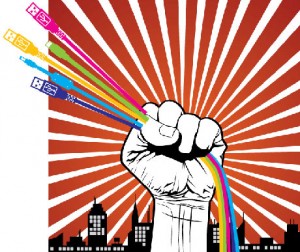I found myself agreeing with the entirety of Victoria George‘s blog post regarding the need for change when companies include slavery in their supply chain. Evidently, I feel strongly about the need for unforgiving enforcement of moral and ethical conduct in a company, as I have blogged about the topic in the past. I understand that a company’s priority is to maximize profit, and that an efficient way of achieving this is to cut costs, however, I cannot imagine a company justifying the use of such horrific means, such as slavery, as part of their production chain.
Being Chinese, it extremely offends me when companies take advantage of predominantly underdeveloped countries and their cheap labour structures as a way to cut costs. Companies also unwilling to admit their wrongful actions, or avoid providing proper explanations for their actions, only further exacerbates unjust behaviour by using this means of production. This can also potentially damage a company’s image, as it could bring guilt when consumers are considering purchasing their products.

Companies of American culture have no excuse to resort to these means of production. In our history, we have fought decade-long battles to abolish slavery. For a company to ignore ethical standards of such high value to better their net profit puts a huge question regarding their moral code. Using slavery is completely unacceptable and ethically unjust.
http://www.theglobeandmail.com/partners/thomsonreuterscapitalize/human-slavery-and-business/article21143153/

 er experience with learning HTML coding as “fun” and an opportunity to “learn a new language”. Abi’s personality, at such a young age, embodies many of the traits listed by Ron Conway to be possessed by a natural born entrepreneur. She had the curiosity, intelligence, and ambition to act upon to create a product that she felt that the shoe market needed. This is particular case contributes to the debate of whether entrepreneurs develop and grow to become who they are, or are simply genetically born with certain traits common among entrepreneurs.
er experience with learning HTML coding as “fun” and an opportunity to “learn a new language”. Abi’s personality, at such a young age, embodies many of the traits listed by Ron Conway to be possessed by a natural born entrepreneur. She had the curiosity, intelligence, and ambition to act upon to create a product that she felt that the shoe market needed. This is particular case contributes to the debate of whether entrepreneurs develop and grow to become who they are, or are simply genetically born with certain traits common among entrepreneurs. 0 years old, it is easy to say that she was simply born to be an entrepreneur. However, I believe that the most successful innovators are those who grow to posses these certain personality characteristics. It is not enough to have an idea if one is not prepared for the adversity of presenting their idea to the wrath of the business world.
0 years old, it is easy to say that she was simply born to be an entrepreneur. However, I believe that the most successful innovators are those who grow to posses these certain personality characteristics. It is not enough to have an idea if one is not prepared for the adversity of presenting their idea to the wrath of the business world.



